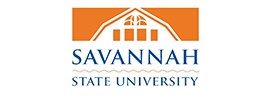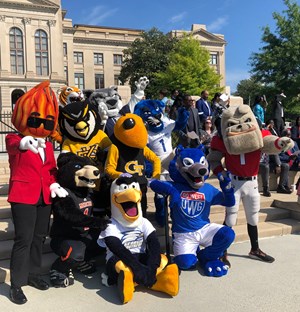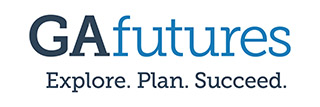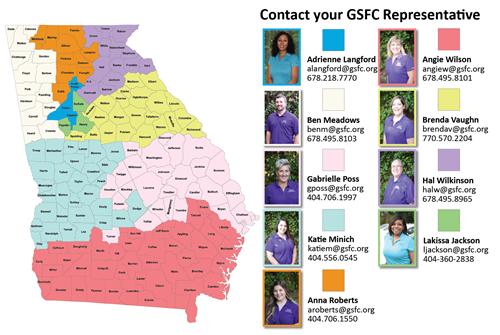Student Newsroom
- USG Institutions Assist with Dual Enrollment
- Financial Literacy Month Means Money Matters More
- Prepare For College with GSFAPP
- Training Opportunities
USG Institutions Assist with Dual Enrollment
The return of warmer weather across the state means summer is almost here. Dual Enrollment allows high school students an opportunity to take college courses during all terms and University System of Georgia colleges are ready to assist.
 “Dual enrollment offers high school students – including all four of my own children – a transformative opportunity to not only accelerate their academic journey,” said University of West Georgia (UWG) provost and senior vice president for academic affairs Dr. Jon Preston to The City Menus, “but also to cultivate essential skills and confidence for success in higher education and beyond.”
“Dual enrollment offers high school students – including all four of my own children – a transformative opportunity to not only accelerate their academic journey,” said University of West Georgia (UWG) provost and senior vice president for academic affairs Dr. Jon Preston to The City Menus, “but also to cultivate essential skills and confidence for success in higher education and beyond.”
UWG is introducing Go West Early in Coweta County, a free program providing transportation to and from area high schools and offering courses that count towards both high school and college graduation.
“This is an amazing opportunity that allows Go West Early Scholars to shorten the time to complete their college degree by as much as a year,” said Kimberly Scranage, UWG’s vice president of strategic enrollment management. “In turn, students can use that flexibility to graduate college sooner, study abroad and strengthen their resumes through experiential learning opportunities like internships.”
 Savannah State University (SSU) has helped high school students earn college credits since 2004 thanks to a partnership with Savannah Early College High School (SECHS).
Savannah State University (SSU) has helped high school students earn college credits since 2004 thanks to a partnership with Savannah Early College High School (SECHS).
“It was a delight to meet these students who might soon join the long ranks of successful SSU alumni,” said Interim President Cynthia Alexander to the Savannah Business Journal. “As we continue to grow our dual enrollment program, the goal is to interact with the students to learn more about their goals and objectives, to energize them and share with them the benefits of being engaged in dual enrollment.”
When making plans for the summer, consider taking a summer semester course at a participating postsecondary institution in Georgia. Watch the video below to learn more about the program and check out the course directory to find a class today.
Financial Literacy Month Means Money Matters More
National Financial Literacy Month is recognized in April to highlight the importance of financial literacy and teach young adults how to establish and maintain healthy habits. In order to raise general awareness of the topic, various financial literacy programs have been launched on a nationwide basis to help students better manage their finances.
 In the near future, over 60% of the jobs in the state will require some form of college education. Plan&Pay4CollegeGA was established by the Georgia Student Finance Commission to assist every Georgia high school graduate attend college. The College Money Matters section focuses on helping future, current and former college students be better equipped to make smart financial choices.
In the near future, over 60% of the jobs in the state will require some form of college education. Plan&Pay4CollegeGA was established by the Georgia Student Finance Commission to assist every Georgia high school graduate attend college. The College Money Matters section focuses on helping future, current and former college students be better equipped to make smart financial choices.
All Georgia residents working towards a certificate or diploma at an eligible Georgia college can receive the HOPE Grant, regardless of their high school GPA. In fact, there are many programs where free tuition is available at any Technical College System of Georgia (TCSG) school.
Make your money matter more by investing in an education that will generate employment without putting you in debt. Contact your local Outreach representative about the resources available to discover affordable ways to pay for a higher education.
Prepare For College with GSFAPP
 The end of the academic school year has high school seniors preparing for college with a major factor still undecided. Problems with the rollout of the Free Application for Federal Student Aid (FAFSA) has caused delays for students waiting to learn about financial aid awards for classes in the fall.
The end of the academic school year has high school seniors preparing for college with a major factor still undecided. Problems with the rollout of the Free Application for Federal Student Aid (FAFSA) has caused delays for students waiting to learn about financial aid awards for classes in the fall.
The Georgia Student Finance Application (GSFAPP) is valid for state funds and programs administered by the Georgia Student Finance Commission. That includes the HOPE & Zell Miller Scholarships and Grants and the Georgia Tuition Equalization Grant.
These programs are not connected to the FAFSA and money awarded will be available for the upcoming school year. The GSFAPP process takes less than five minutes and is good for 10 years.
All of this can be accomplished from your GAfutures student account. Don’t have one yet? Create one today!
Note: GAfutures is a secure site and we never sell information.
Training Opportunities
Remember, GSFC’s outreach staff is available year-round to conduct FREE training's, workshops and information sessions across the state of Georgia.
Over the last year, GSFC’s outreach team has incorporated online live webinars.
Topics include:
- State financial aid programs (HOPE, Dual Enrollment, etc.)
- SURFER/STARS
- Transcript Exchange
- FAFSA Completion
- GAfutures.org Overview
Visit the Outreach module to learn more about the GSFC’s outreach team what services are provided.
Contact your outreach representative to schedule your training, or contact our offices:
Phone: 770.724.9000 Toll Free: 800.505.GSFC
K -12 email: outreach@gsfc.org
Postsecondary email: SAS@gsfc.org












